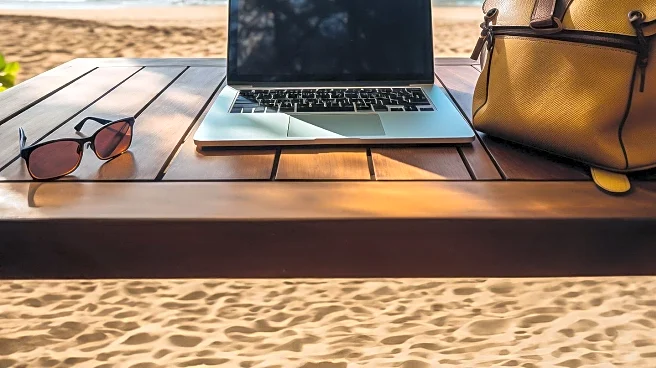What's Happening?
Bleisure travel, a trend combining business and leisure travel, is gaining traction among global employees, with nearly half planning to engage in it in 2024. This approach allows individuals to extend work trips for personal enjoyment, enhancing job
satisfaction and well-being. The trend has seen a 25% growth in interest over the past year, driven by post-pandemic travelers seeking enriched experiences. Hotels are adapting by offering new room types for longer stays, catering to both business and leisure travelers. This shift reflects a broader trend towards flexible work styles and the integration of work and personal life.
Why It's Important?
The rise of bleisure travel is significant as it highlights a shift in workplace culture towards valuing employee well-being and flexible work arrangements. Businesses stand to benefit from happier, more productive employees who are able to balance work commitments with personal relaxation. This trend also presents opportunities for the hospitality industry to innovate and cater to the needs of bleisure travelers, potentially boosting revenue through extended stays and enhanced services. However, it also underscores the need for clear risk management strategies to address potential coverage gaps when blending business and leisure travel.
What's Next?
As bleisure travel continues to grow, companies may need to revise travel policies to accommodate this trend, ensuring clear guidelines on expense coverage and work expectations. The hospitality industry is likely to further adapt by offering more tailored services for bleisure travelers, such as co-working spaces and leisure amenities. Additionally, businesses may explore partnerships with travel providers to offer exclusive packages that enhance the bleisure experience. This trend could also influence corporate culture, encouraging more flexible work arrangements and promoting a healthier work-life balance.
Beyond the Headlines
Bleisure travel could lead to long-term shifts in how companies approach employee travel and work-life balance. It raises ethical considerations around the blurring of work and personal time, potentially impacting employee productivity and mental health. Companies may need to address these challenges by fostering a culture that supports disconnecting from work during leisure time. Furthermore, the trend could influence urban development, with cities investing in infrastructure and attractions that appeal to bleisure travelers, thereby boosting local economies.

















